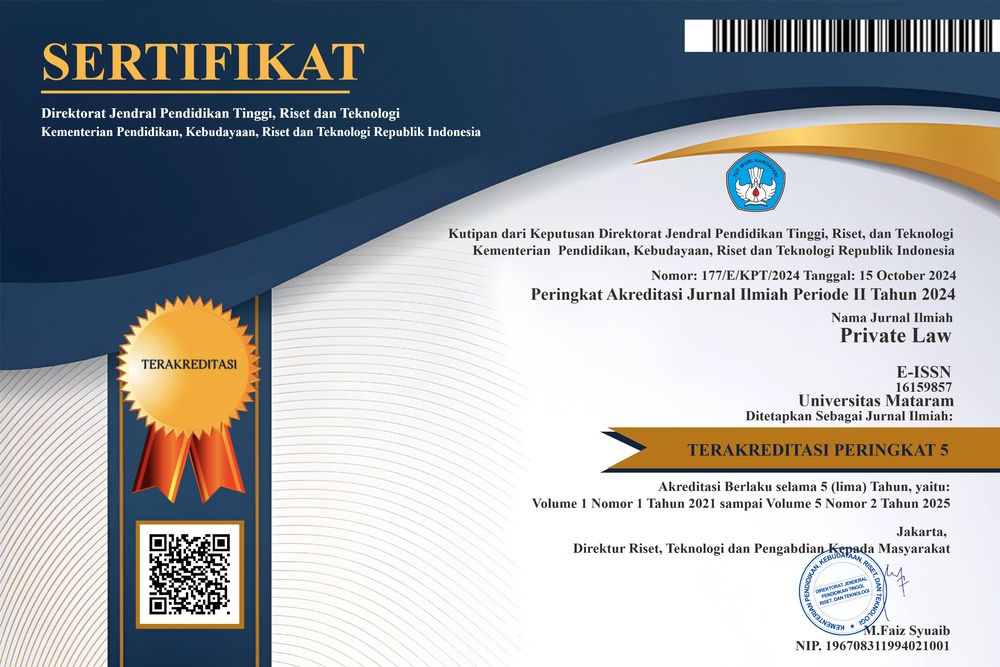Analisis Prinsip Hutang Piutang Menurut Hadis dan Versi Pinjaman Online
DOI:
https://doi.org/10.29303/prlw.v5i1.6267Kata Kunci:
Debt, Receivables, Hadith, Online LoansAbstrak
The development of technology in today's society has also given rise to new innovations in financial services based on information technology known as Financial Technology (Fintech). Fintech lending or also called Fintech Peer-to-Peer Lending or services. borrowing and lending money based on information technology is one of the innovations in the financial sector by utilizing technology that allows lenders and borrowers to carry out borrowing and lending transactions without having to meet in person. The borrowing and lending transaction mechanism is carried out through a system that has been provided by the Fintech Lending organizer, either through an application or a website. This study uses qualitative research through library research that will examine the principles of debt according to the hadith and the version of loan debt. Therefore, online loans that are in accordance with the practice of the Prophet Muhammad saw. are the absence of additional money or nominal from the creditor (owner of the money), because if that happens then the interpretation is different, then that is what is called usury. However, seen from the practice of online loans that are circulating, the agreement at the beginning is stated with the interest rate already found starting from 3% and so on, so if the online loan is in the form of that, of course it is said to be a loan that contains usury and is not in accordance with the Hadith of the Prophet Muhammad.Referensi
Ad- Durar As-Sunniyah. (n.d.). Ensiklopedia Hadis. In Ad- Durar As-Sunniyah.
Arriza, Lc, M. R. (2015). Teori dan Praktek Akad Qardh dalam Syariat Islam. 9(2), 245–266. https://doi.org/https://doi.org/10.21111/ijtihad.v9i2.2530
Cut Fauziah. (2017). At-Tijarah (Perdagangan) Dalam Alquran (Studi Komparatif Tafsir Jami‘ Li Ahkam Alquran dan Tafsir Al-Mishbah). Jurnal Akuntansi, 11(1), 76–96. https://doi.org/doi.org/10.32505/at-tibyan.v2i1.253
Hendra Rofiullah, A., Raharto, E., & Farhan. (2021). Pandangan Hukum Islam Terhadap Akad Dan Praktik Qard (Hutang Piutang). Esa, 3(2), 35–47. https://doi.org/10.58293/esa.v3i2.24
Hidayati, T., Tiara Tanjung, Y., & Faqrurrowzi, L. (2022). Socialization of the Role and Risks of Online Loans. Jurnal PKM Journal Liaison Academia and Society (J-LAS, 2022(2), 107–113. https://doi.org/doi.org/10.58939/j-las.v2i4.435
Imam Abu Dawud. (1415). Sunan Abî Dâwūd. Dar al-Fikr.
Imam Ahmad Bin Hanbal. (1416). Musnad Ahmad ibn Hanbal. Dar al-Hadis.
Imam al- Bukhārī. (1401). Şaḩîḩ Bukhārī. Dar al-Fikr.
Imam Muslim. (1414). Şaḩîḩ Muslim. Dar al-Fikr.
Manik, R. G., & Samariadi, S. (2023). Akibat Hukum Penerima Dana Layanan Pendanaan Bersama Berbasis Teknologi Informasi Gagal Bayar. Jurnal Magister Hukum Perspektif, 14(1), 13–27. https://doi.org/10.37303/magister.v14i1.73
Niskaromah. (2024). Telaah Utang Piutang Perspektif Islam Dan Pinjol. Journal of Innovation Research and Knowledge, 3(8), 1721–1736.
Nur Fauzi, F., Ayu Mulyaningsih, D., Lutfiah, W., Musfiqoh, S., & Abdul, H. (2018). Pinjaman Online Perspektif Ekonomi Islam. El-Qist: Journal of Islamic Economics and Business (JIEB), 8(2), 1638–1658. https://doi.org/10.15642/elqist.2018.8.2.1638-1658
Pardosi, R. O. A. G., & Primawardani, Y. (2020). Perlindungan Hak Pengguna Layanan Pinjaman Online dalam Perspektif Hak Asasi Manusia. Jurnal HAM, 11(3), 353. https://doi.org/10.30641/ham.2020.11.353-368
Riani, S. D. (2023). Dampak Fatherless Terhadap Kondisi Psikologis Remaja di Desa Tanjung Harapan Kecamatan Pangkatan Kabupaten Labuhanbatu. uinsyahada. https://doi.org/https://doi.org/10.21107/pgpaudtrunojoyo.v1i2.3551
Rizqa Amelia, Muhammad Farhan Harahap, S. D. (2023). Pinjaman Online Dalam Perspektif Hukum Islam. Ekonomi Bisnis Manajemen Dan Akutansi, 4(1), 1255–1262. https://doi.org/doi.org/10.5281/zenodo.8305934
Setiadi, H. (2023). Kajian Hukum Islam Tidak Membayar Hutang pada Pinjaman Online Ilegal. Hijaz: Jurnal Ilmu-Ilmu Keislaman, 2(2), 51–56. https://doi.org/10.57251/hij.v2i2.825
Thoha, A. B. (2023). Pinjaman Online Dalam Tinjauan Hukum Islam. Jurnal Informatika Komputer, Bisnis dan Manajemen, 20(1), 80–94. https://doi.org/10.61805/fahma.v20i1.46
Wahyudi, A. (2003). Adln – perpustakaan universitas airlangga. Universitas Airlangga, Surabaya, September, 1–21. https://doi.org/10.1002/14651858.CD004439.pub2.De
Unduhan
Diterbitkan
Cara Mengutip
Terbitan
Bagian
Lisensi
Hak Cipta (c) 2025 Private Law

Artikel ini berlisensi Creative Commons Attribution 4.0 International License.











